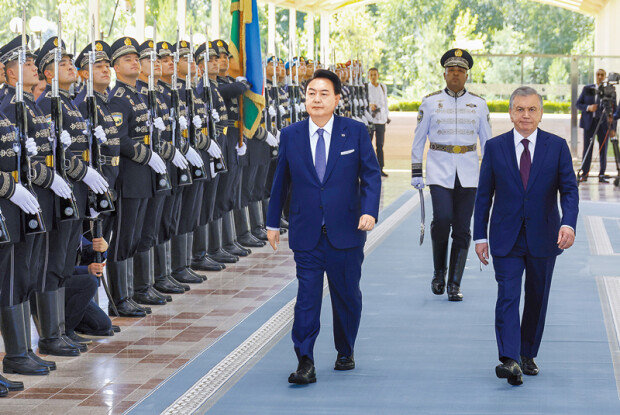Korean high-speed rail to run in Uzbekistan
Korean high-speed rail to run in Uzbekistan
Posted June. 15, 2024 08:39,
Updated June. 15, 2024 08:39

On the occasion of Korean President Yoon Suk Yeol's state visit to Uzbekistan, Hyundai Rotem signed a contract on June 14 to export 42 high-speed rail vehicles, capable of speeds up to 250 km/h, to Uzbekistan. This contract, valued at approximately 270 billion Korean won, marks the first export of high-speed rail vehicles developed with Korea's proprietary technology, accumulated over the 20 years since the introduction of the Korean Train Express ("KTX"), signaling a significant step towards entering the global market.
President Yoon, who is on a tour of three Central Asian countries, announced this agreement in a joint statement with Uzbek President Shavkat Mirziyoyev after their summit meeting at the presidential palace in Tashkent. Hyundai Rotem signed a contract with Uzbekistan Railways to supply the high-speed rail vehicles and provide maintenance services (two years of regular maintenance and nine months of major maintenance). Both countries' railway corporations and Hyundai Rotem also signed a memorandum of understanding (MOU) for the operation and maintenance of high-speed trains.
At the Korea-Uzbekistan Business Forum held on the same day, President Yoon stated that for the first time, high-speed rail vehicles developed with Korea's proprietary technology will run outside Korea in Uzbekistan, significantly contributing to the improvement of Uzbekistan's railway services. The two countries also agreed to actively cooperate on large-scale infrastructure projects, such as the 'Tashkent-Andijan Highway,' which is scheduled for bidding in the second half of the year and valued at approximately 5.35 billion U.S. dollars. The Ministry of Trade, Industry and Energy of Korea, the Ministry of Construction and Public Housing of Uzbekistan, and the Ministry of Energy of Uzbekistan signed agreements to modernize regional heating systems, thereby establishing a foundation for exporting Korea's district heating systems.
Furthermore, the Ministry of Trade, Industry and Energy of Korea and the Ministry of Mining and Geology of Ukraine signed a partnership to cooperate on the supply chain of critical minerals, such as tungsten and molybdenum, which are essential for secondary batteries. If economic feasibility is confirmed, this partnership will create preferred opportunities for Korean companies to participate in developing and producing these resources.
Kwan-Seok Jang jks@donga.com
Headline News
- People Power Party edges closer to impeachment of Pres. Yoon
- GM Korea produces four out of 10 bestsellers in U.S. small SUV market
- Former Defense Minister Kim attempts suicide at detention center
- ‘U.S. military to maintain forces in S. Korea at current level of 28,500’
- Liverpool FC leads UEFA Champions League







